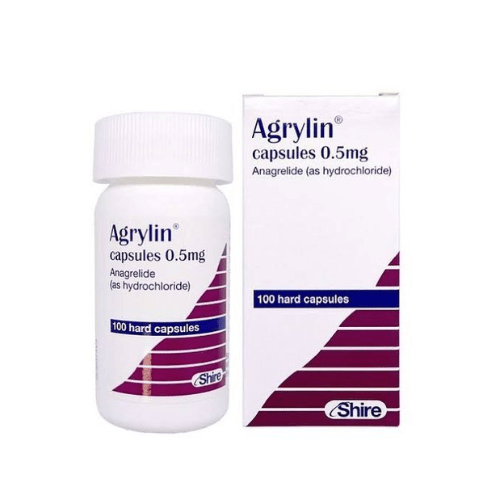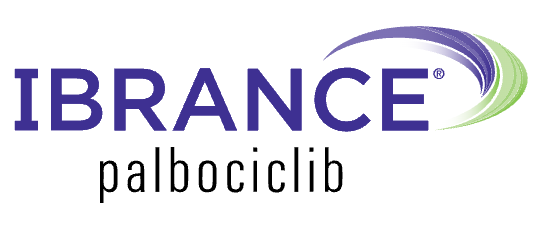
Agrylin, also known as anagrelide hydrochloride, is a prescription medication used to treat thrombocythemia, a condition characterized by an abnormally high platelet count. Platelets are blood cells that play a crucial role in blood clotting. An elevated platelet count can increase the risk of blood clots, which can lead to serious health problems, including stroke, heart attack, and pulmonary embolism.
Symptoms of thrombocythemia may include:
- Headaches.
- Dizziness or lightheadedness
- Chest pain or discomfort
- Weakness or fatigue:
- Bleeding
- Visual disturbances
- Thromboembolism
- Numbness or tingling
- Red or purple skin discoloration
- Enlarged spleen or liver
It’s important to consult with a healthcare professional for proper evaluation and diagnosis if you suspect you may have thrombocythemia or are experiencing these symptoms.
FDA and Manufacture Details
Agrylin (anagrelide hydrochloride) was approved by the Food and Drug Administration (FDA) in 1997 for the treatment of thrombocythemia secondary to myeloproliferative disorders. Myeloproliferative disorders are a group of blood cancers that cause the bone marrow to produce too many blood cells. Agrylin is manufactured by Shire US Inc.
Indications and Usage
Anagrelide is prescribed as a platelet-reducing agent to treat thrombocythemia associated with myeloproliferative neoplasms. Its purpose is to lower elevated platelet counts, diminish the risk of thrombosis, and alleviate symptoms, including thrombo-hemorrhagic events.
Dosage and Administration
- Anagrelide is initiated in adults at a starting dose of 0.5 mg four times a day or 1 mg twice a day, while pediatric patients begin with a daily agrylin 0.5 mg dose.
- Maintain the initial dose for at least one week, then titrate to sustain target platelet counts.
- Avoid exceeding a weekly dose increment of 0.5 mg or a daily maximum of 10 mg or 2.5 mg in a single dose.
- In cases of moderate hepatic impairment, commence with a agrylin 0.5 mg daily dose in capsule form.
Warnings and Precautions
- Cardiovascular Toxicity: Anagrelide has been associated with QT prolongation and ventricular tachycardia. Conduct a pre-treatment cardiovascular examination, including an ECG, for all patients. Continuous monitoring for cardiovascular effects is essential.
- Pulmonary Hypertension: Prior to initiating therapy, evaluate patients for underlying cardiopulmonary disease. Agrylin can cause changes in heart rhythm, such as tachycardia (rapid heart rate) and palpitations (irregular heartbeat).
- Bleeding Risk: Exercise caution and monitor patients for signs of bleeding, especially those concurrently receiving medications known to increase bleeding risk.
Contraindications
Severe hepatic impairment: Agrylin is not recommended for use in patients with severe liver disease.
Hypersensitivity to anagrelide: Patients with a known allergy to anagrelide or any of the ingredients in Agrylin should not take this medication.
Use of Agrylin in Specific Populations
Pregnancy: Limited studies in pregnant women. Animal studies showed fetal delays at doses higher than the clinical maximum (10 mg/day). Use during pregnancy only if benefits outweigh potential risks.
Nursing Mothers: Unknown excretion of anagrelide in human milk. Detected in rat milk. Consider discontinuing nursing or drug, weighing drug importance.
Pediatric Use: Safety study in 18 pediatric patients (7-16 years) showed no apparent differences in adverse events compared to adults.
Geriatric Use: No notable differences in safety or effectiveness in subjects aged 65 and over. Some sensitivity differences possible.
Hepatic Impairment: Anagrelide clearance is hepatic-dependent. Significant exposure increase in moderate hepatic impairment, requiring dose reduction. Unstudied in severe hepatic impairment. Assess risks and benefits in mild to moderate hepatic impairment; assess hepatic function before and during treatment.
Drug Interactions
Using this medication along with other drugs that affect PDE 3 may intensify certain effects on the heart, and when taken with aspirin or other medications that increase bleeding risk, it may heighten the chances of bleeding.
Common Side Effects Of Agrylin
- Headache
- Palpitations
- Diarrhea
- Asthenia
- Edema
- Nausea
- Abdominal pain
- Dizziness
- Pain
- Dyspnea
- Cough
- Flatulence
- Vomiting
- Fever
- Peripheral edema
- Rash
- Chest pain
- Anorexia
- Tachycardia
- Malaise
- Paresthesia
- Back pain
- Pruritus
- Dyspepsia
Overdosage Of Agrylin:
Higher-than-recommended doses may lead to hypotension. Intentional overdose reports include sinus tachycardia and vomiting, resolved with supportive management. Anagrelide’s dose-related platelet reduction may result in thrombocytopenia and bleeding. Close clinical supervision, especially platelet count monitoring, is crucial in case of overdosage. Stop dosage until platelet count normalizes.
Conclusion
Agrylin is an effective treatment for thrombocythemia secondary to myeloproliferative disorders. However, it is important to be aware of the potential side effects of this medication and to use it only under the supervision of a doctor.
FAQs
How does Agrylin work?
Agrylin works by reducing the production of platelets, preventing them from reaching excessively high levels and decreasing the risk of thrombosis.
Can pregnant women use Agrylin?
The safety of Agrylin in pregnant women has not been extensively studied. It should be used during pregnancy only if the potential benefits outweigh the potential risks.
Is Agrylin safe for breastfeeding mothers?
The excretion of Agrylin in human milk is not well-known. Breastfeeding mothers should weigh the importance of the drug to them against the potential risks to the infant.
How to store Agrylin?
Store Agrylin at 25°C (77°F) with excursions allowed between 15-30°C (59-86°F) in a light-resistant container. Keep it in its original packaging, protecting it from light exposure. Avoid extreme temperatures and refrain from refrigeration unless specified by the manufacturer for optimal storage conditions.
How to buy Agrylin online?
To acquire Agrylin online, connect with SANSFRO or similar specialized pharmaceutical procurement companies that facilitate the importation of medicines, especially from regions like the US and Europe. The availability and pricing of Agrylin are influenced by various factors. For accurate information tailored to the Indian market, contact the dedicated Patient Support Team at (+91) 93157 05373 or help@sansfro.com.
What is the Agrylin price?
Various factors and product specifications determine the cost of Agrylin. For precise Agrylin price information in the Indian market, please reach out to our Patient Support Team at (+91) 93157 05373 or via email at help@sansfro.com. Our team can provide you with up-to-date and accurate cost details for Agrylin.
Reference



